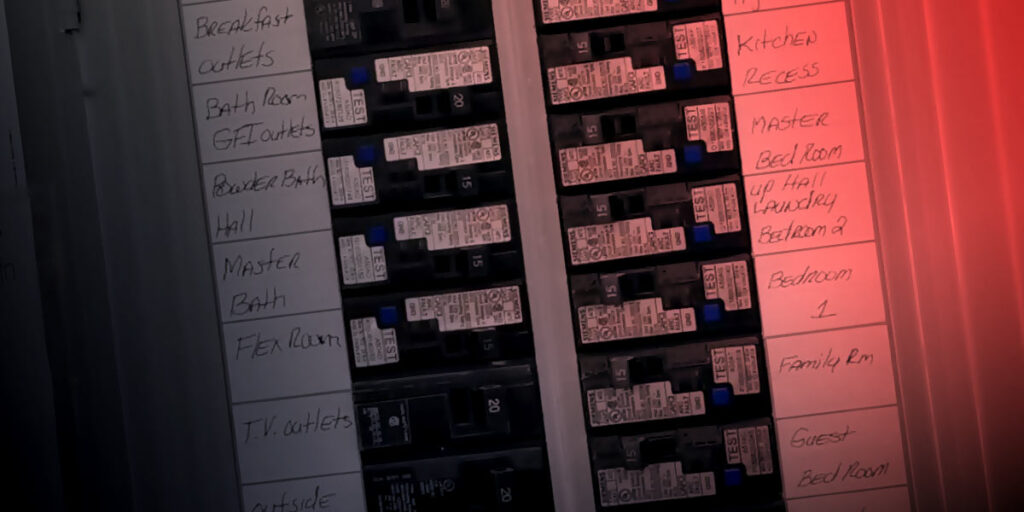Do You Have a Tripped Circuit Breaker? 12 Reasons Why
It’s always frustrating dealing with a tripped circuit breaker. Here are 12 reasons why your circuit breaker is tripping and when to get a new one.
Does your circuit breaker keep tripping?
It’s always frustrating dealing with a tripped circuit breaker. With so many possible reasons for a trip, it can be hard to find and fix the problem. But before you start ripping your electrics apart, you need to know the root cause.
Here are 12 reasons why your circuit breaker is tripping and when to get a new one.
What to Do When it Trips
Before trying to work out what caused your circuit breaker to trip, there are some things you need to do. On your circuit breaker panel, look for a label next to a tripped breaker. Or there might be a sheet on the panel door.
This tells you what circuit that breaker is protecting. Once you know what area you’re dealing with, unplug everything in that room or group of rooms. Lamps, TVs, computers, games consoles – unplug it all. Then you should reset the circuit breaker.
If the circuit breaker doesn’t trip immediately this suggests a temporary issue. It might have caused your circuit to overload. Overloading the circuit means there’s more electricity running through than it can handle.
If your circuit breaker trips immediately, the issues could be more serious. It hints at an issue with the breaker itself or the circuitry. There are many reasons a breaker can trip, so we’ve compiled a list of the 12 most common issues below.
1. Overloaded Circuit
The most likely cause of a tripped circuit breaker is an overloaded circuit. This happens if your circuit tries to carry more electricity than it can handle. If too many electrical devices are running at once, for example.
It causes the breaker to get hot and trips, breaking the circuit and stopping the problem. The circuit will remain off until a manual reset of the breaker back to ‘on’. When the breaker switches back ‘on’, it resets the breaker.
The breaker uses a size that matches the circuitry wires. This ensures that the breaker will trip before the wires heat up and become a fire risk.
If your circuit breaker keeps tripping, it’s a sign you’re straining your circuitry. You’ll need to change some of your devices or appliances onto other circuits. If this doesn’t work, it could be a sign that your home doesn’t have enough circuits and you might need to upgrade your electrics.
2. A Short Circuit
Short circuits are one of the more serious reasons behind a tripped breaker. It happens when the live wire touches against the neutral wire.
This touching allows the unhindered flow of electricity that bypasses the full circuit. This is where the term ‘short circuit’ comes from, as it’s taking a shorter path. This surge in electrical current is what sets off the circuit breaker.
3. A Short Circuit in an Appliance
Sometimes, short circuits aren’t caused by your wiring. They can happen because of wiring issues in one of your devices or appliances.
Because of this, it can make diagnosing the cause of a short circuit difficult. You might need to call out an electrician. But one way you can check for a short circuit is if your breakers trips immediately after a reset.
4. Ground Fault
A ground fault happens when a live wire touches a ground wire, wood framing pr any metal.
Ground faults are especially dangerous if they happen in kitchens, bathrooms, and outdoor areas. But, no matter the area, ground faults put you at risk of getting shocked.
To find a ground fault you can use GFCIs. GFCIs keep track of the power going through an appliance when you plug it in. It will pick up any interruption and cut the power.
5. Your Air Conditioner
A common cause for your circuit breaker tripping is actually your AC unit. And there can be a few reasons for this. Usually, your AC unit has a higher rating than 20 amps, and it’s trying to pull too much power at once. Or there could be a fault with the unit, which will need professional attention.
For older compressors, they can wear down and need more power to start up. This is a ‘hard start’. As the startup phase takes a lot of power already, drawing more can cause your breaker to think there’s a surge.
Another problem with compressors, especially older ones, is grounding. The electrical winding inside the compressor can break. It can then come into contact with the wall of the compressor. If this happens, it ignites the oil, and burn out the unit. Not only will your compressor be useless, but your breaker will trigger and trip.
Due to the fact it’s the hardest working part in your AC unit, your motor can also cause issues. It can be running for a long time at once and the wire insulation can wear down. This can cause the wire to short circuit and trip your breaker. If you suspect an issue with your AC, it’s important to call out a technician to take a look.
6. Your Furnace
Your furnace can be another common reason for your circuit breaker to trip. Usually, this large appliance runs on 15 amps. But if it doesn’t have regular maintenance, you can have issues that cause overloading.
Sometimes, though it’s rare, your furnace might share a circuit with other appliances. It’s best to keep your furnace on its own circuit due to the fact it needs so much power to run. This way, you can help prevent overloading.
7. You Have an Old Panel
If your home is from the 90s or before, and you haven’t replaced your electrical panel, it’s past its functional lifespan. An old electrical panel can pose many dangers, including posing a fire risk.
Loose connections and wires, and old switches can lead to your panel malfunctioning. You’ll want to replace your old one before it gives up on you and causes further issues!
8. Storms
A lightning strike to an electric cable nearby or to your actual home can destroy your electronics and breakers in one go. Or, it could take out 1 or 2, only. It depends on the strike and a lot on luck too.
Usually, it shouldn’t be an issue that lasts longer than the storm itself. But once it’s done, if you can’t get power back on then you need to call in an expert electrician for repairs.
9. Broken Breaker
Circuit breakers are like any other device in your home in the fact that they can get old, go bad, and stop working. So once you’ve made sure nothing’s plugged in on the circuit, you can flip your breaker.
You should hear a clear ‘click’ once you flip it back ‘on’. If the switch flops back and forth without settling on ‘on’ or ‘off’, then your breaker has gone bad. You’ll need to look at it and have it fixed, and that’s best done by a professional.
10. Moisture Exposure
If water or moisture has entered the control box where your circuit breaker is, your breakers to trip. This moisture can come from something an innocuous as condensation.
If this happens, the moisture will damage electrical components within the control box. Once damaged, you’ll need to have these components replaced immediately. It’s best to take measures to prevent moisture in the future too.
11. Power Surges
We’ve seen how certain wires are able to handle set amounts of amps. But appliances are also designed to handle a set amount of volts.
Common causes of power surges include:
- Lightning/electrical storms
- Broken power lines
- Poor/faulty wiring
- Power outages
- Big appliances cycling off and on
- Power plant maintenance
- Fault electrical components
A power surge is when incoming power exceeds the voltage limit your appliance can handle. Not only can it damage your circuitry and appliances, but it can also pose a fire hazard to your home and shock risk. One of the best methods to protect your home is to install a whole house power surge protector.
12. Arc Fault
The National Electrical Code has increased the requirements for arc-fault circuit interrupters (AFCIs). This is a specific type of circuit breaker.
AFCI breakers will trip due to overloads, short circuits and ground faults. They also detect power fluctuations from sparking (arcing) between contact points in the wire connections.
Arcing can occur from loose screw terminal connections in an outlet or switch. An AFCI breaker senses early wiring issues before they can cause problems. If you’re breakers repeatedly trip, it could show that there is a loose wire connection.
Ordinary circuit breakers and fuses don’t offer protection from arc faults. Given that arcing creates a fire hazard, having arc fault protection is an important safeguard.
Make Your Tripped Circuit Breaker a Thing of the Past
As you can see, there are plenty of possible reasons for a tripped circuit breaker. Your home’s electrical system can be complex, so if you are unable to find and fix the cause of your trip, contact an electrician to ensure your system has been made safe.
If you have a problem with your electrics, contact us today at Servicewise. Whether you need a repair or an upgrade, we have the skill and experience to get the job done.


